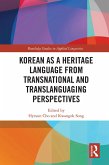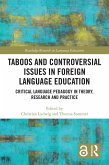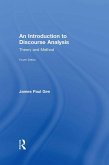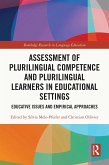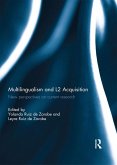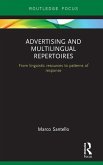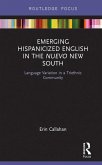Korean as a Heritage Language from Transnational and Translanguaging Perspectives (eBook, PDF)
Redaktion: Cho, Hyesun; Song, Kwangok
41,95 €
41,95 €
inkl. MwSt.
Sofort per Download lieferbar

21 °P sammeln
41,95 €
Als Download kaufen

41,95 €
inkl. MwSt.
Sofort per Download lieferbar

21 °P sammeln
Jetzt verschenken
Alle Infos zum eBook verschenken
41,95 €
inkl. MwSt.
Sofort per Download lieferbar
Alle Infos zum eBook verschenken

21 °P sammeln
Korean as a Heritage Language from Transnational and Translanguaging Perspectives (eBook, PDF)
Redaktion: Cho, Hyesun; Song, Kwangok
- Format: PDF
- Merkliste
- Auf die Merkliste
- Bewerten Bewerten
- Teilen
- Produkt teilen
- Produkterinnerung
- Produkterinnerung

Bitte loggen Sie sich zunächst in Ihr Kundenkonto ein oder registrieren Sie sich bei
bücher.de, um das eBook-Abo tolino select nutzen zu können.
Hier können Sie sich einloggen
Hier können Sie sich einloggen
Sie sind bereits eingeloggt. Klicken Sie auf 2. tolino select Abo, um fortzufahren.

Bitte loggen Sie sich zunächst in Ihr Kundenkonto ein oder registrieren Sie sich bei bücher.de, um das eBook-Abo tolino select nutzen zu können.
This collection critically reflects on the state-of-the-art research on Korean-as-a-heritage-language (KHL) teaching and learning, centering KHL as an object of empirical inquiry by offering multiple perspectives on its practices and directions for further research.
- Geräte: PC
- mit Kopierschutz
- eBook Hilfe
Andere Kunden interessierten sich auch für
![Korean as a Heritage Language from Transnational and Translanguaging Perspectives (eBook, ePUB) Korean as a Heritage Language from Transnational and Translanguaging Perspectives (eBook, ePUB)]() Korean as a Heritage Language from Transnational and Translanguaging Perspectives (eBook, ePUB)41,95 €
Korean as a Heritage Language from Transnational and Translanguaging Perspectives (eBook, ePUB)41,95 €![Taboos and Controversial Issues in Foreign Language Education (eBook, PDF) Taboos and Controversial Issues in Foreign Language Education (eBook, PDF)]() Taboos and Controversial Issues in Foreign Language Education (eBook, PDF)41,95 €
Taboos and Controversial Issues in Foreign Language Education (eBook, PDF)41,95 €![An Introduction to Discourse Analysis (eBook, PDF) An Introduction to Discourse Analysis (eBook, PDF)]() James Paul GeeAn Introduction to Discourse Analysis (eBook, PDF)46,95 €
James Paul GeeAn Introduction to Discourse Analysis (eBook, PDF)46,95 €![Assessment of Plurilingual Competence and Plurilingual Learners in Educational Settings (eBook, PDF) Assessment of Plurilingual Competence and Plurilingual Learners in Educational Settings (eBook, PDF)]() Assessment of Plurilingual Competence and Plurilingual Learners in Educational Settings (eBook, PDF)40,95 €
Assessment of Plurilingual Competence and Plurilingual Learners in Educational Settings (eBook, PDF)40,95 €![Multilingualism and L2 Acquisition (eBook, PDF) Multilingualism and L2 Acquisition (eBook, PDF)]() Multilingualism and L2 Acquisition (eBook, PDF)45,95 €
Multilingualism and L2 Acquisition (eBook, PDF)45,95 €![Advertising and Multilingual Repertoires (eBook, PDF) Advertising and Multilingual Repertoires (eBook, PDF)]() Marco SantelloAdvertising and Multilingual Repertoires (eBook, PDF)23,95 €
Marco SantelloAdvertising and Multilingual Repertoires (eBook, PDF)23,95 €![Emerging Hispanicized English in the Nuevo New South (eBook, PDF) Emerging Hispanicized English in the Nuevo New South (eBook, PDF)]() Erin CallahanEmerging Hispanicized English in the Nuevo New South (eBook, PDF)23,95 €
Erin CallahanEmerging Hispanicized English in the Nuevo New South (eBook, PDF)23,95 €-
-
-
This collection critically reflects on the state-of-the-art research on Korean-as-a-heritage-language (KHL) teaching and learning, centering KHL as an object of empirical inquiry by offering multiple perspectives on its practices and directions for further research.
Dieser Download kann aus rechtlichen Gründen nur mit Rechnungsadresse in A, B, BG, CY, CZ, D, DK, EW, E, FIN, F, GR, HR, H, IRL, I, LT, L, LR, M, NL, PL, P, R, S, SLO, SK ausgeliefert werden.
Produktdetails
- Produktdetails
- Verlag: Taylor & Francis
- Seitenzahl: 252
- Erscheinungstermin: 14. Dezember 2022
- Englisch
- ISBN-13: 9781000789676
- Artikelnr.: 66381389
- Verlag: Taylor & Francis
- Seitenzahl: 252
- Erscheinungstermin: 14. Dezember 2022
- Englisch
- ISBN-13: 9781000789676
- Artikelnr.: 66381389
- Herstellerkennzeichnung Die Herstellerinformationen sind derzeit nicht verfügbar.
Hyesun Cho (Ph.D. University of Hawai'i at M¿noa) is Associate Professor of TESOL in the Department of Curriculum and Teaching at the University of Kansas, USA. In addition to working with undergraduate and graduate students in education, Hyesun directs a faculty-led summer study abroad program in Korea where student teachers teach English in the Korean secondary classroom. Her research interests include heritage language education, critical literacy, social identity, and teacher education for social justice. Her work has appeared in Race, Ethnicity and Education; Critical Inquiry in Language Studies; Language and Education; Curriculum Inquiry; and Teaching and Teacher Education. Her research monograph (with R. Al-Samiri and J. Gao) on transnational graduate students in US TESOL programs was published by Routledge in 2022. Kwangok Song (Ph.D. The University of Texas at Austin) is Associate Professor of Literacy Education in the Department of Curriculum and Teaching at the University of Kansas, USA. Kwangok's research concerns sociocultural factors and sociocognitive aspects of literacy and learning. Particularly, her research addresses the intersection of language, literacy, and learning to explore biliteracy practices and the impact of language ideologies on literacy practices within the multilingual immigrant communities. Her recent work appeared in the Journal of Early Childhood Literacy, Language Arts, Bilingual Research Journal, International Journal of Bilingual Education and Bilingualism, Theory into Practice, and Educational Research Review.
Table of Contents
List of Contributors
Chapter 1. Transnational and Translanguaging Approaches: Korean as a
Heritage Language (KHL)
Hyesun Cho, The University of Kansas, USA
Kwangok Song, The University of Kansas, USA
Part I. Family Engagement and Practice in Korean as a Heritage Language
Chapter 2. Weaving Translingual Identity into Family Language Policy: An
Autoethnography of Raising a Heritage Language Learner
Juyoung Song, Murray State University, USA
Chapter 3. Ambivalent Beliefs and Attitudes of Korean Immigrant Parents
with Young Children toward Heritage Language
Jinhee Kim, Kennesaw State University, USA
Chapter 4. Korean Parents' Attitudes toward Their Children's Maintaining of
Heritage Language in Australia
Min Jung Jee, The University of Queensland, Australia
Chapter 5. Family Language Policy in Two Mixed-Heritage Families in New
Zealand: Perspectives of Korean Migrant Mothers
Mi Yung Park, University of Auckland, New Zealand
Chapter 6. Two Young Siblings' Translingual Literacy Practices in a
Trilingual Home in the U.S.
Jayong Choi, Kennesaw State University, USA
Chapter 7. Learning Together Through Reading Together: Multimodal
Translanguaging Literary Practice in the KHL family
Jieun Kiaer, University of Oxford, UK
Jiyeon Sheo, Seoul National University, South Korea
Part II. KHL Learning and Teaching in Community-Based Contexts
Chapter 8. Korean Immigrant Children's Transnational Funds of Knowledge and
Literacy Practices in the Heritage Language Classroom
Jungmin Kwon, Michigan State University, USA
Ahrum Jeon, Boston College, USA
Chapter 9. Bilingualism as a Decision-Making Process: Emergent Korean
Bilinguals' Use of Two Languages and Korean Honorifics
So Jung Kim, University of Texas at El Paso, USA
Clara Lee Brown, University of Tennessee, Knoxville, USA
Song An, The University of Texas at El Paso, USA
Chapter 10. Translanguaging in Action: Incorporating Translanguaging
Pedagogy in a Korean Heritage Language Classroom
Chaehyun Lee, Southeastern Oklahoma State University, USA
Chapter 11. "Oh, What's Wrong with Your Korean?": Korean American Adult
Heritage Learner's Oral Translanguaging Practice and Their
Counter-Experience
Hanae Kim, The University of Illinois at Chicago, USA
Chapter 12. Discursive Analysis of Korean College Heritage Learners'
Translanguaging Practices in Diverse Social Contexts
Hakyoon Lee, Georgia State University, USA
Gyewon Jang, Georgia State University, USA
Ch. 13. Korean as a Heritage Language Education in the Global-Local Nexus
Kwangok Song, The University of Kansas, USA
Hyesun Cho, The University of Kansas, USA
Index
List of Contributors
Chapter 1. Transnational and Translanguaging Approaches: Korean as a
Heritage Language (KHL)
Hyesun Cho, The University of Kansas, USA
Kwangok Song, The University of Kansas, USA
Part I. Family Engagement and Practice in Korean as a Heritage Language
Chapter 2. Weaving Translingual Identity into Family Language Policy: An
Autoethnography of Raising a Heritage Language Learner
Juyoung Song, Murray State University, USA
Chapter 3. Ambivalent Beliefs and Attitudes of Korean Immigrant Parents
with Young Children toward Heritage Language
Jinhee Kim, Kennesaw State University, USA
Chapter 4. Korean Parents' Attitudes toward Their Children's Maintaining of
Heritage Language in Australia
Min Jung Jee, The University of Queensland, Australia
Chapter 5. Family Language Policy in Two Mixed-Heritage Families in New
Zealand: Perspectives of Korean Migrant Mothers
Mi Yung Park, University of Auckland, New Zealand
Chapter 6. Two Young Siblings' Translingual Literacy Practices in a
Trilingual Home in the U.S.
Jayong Choi, Kennesaw State University, USA
Chapter 7. Learning Together Through Reading Together: Multimodal
Translanguaging Literary Practice in the KHL family
Jieun Kiaer, University of Oxford, UK
Jiyeon Sheo, Seoul National University, South Korea
Part II. KHL Learning and Teaching in Community-Based Contexts
Chapter 8. Korean Immigrant Children's Transnational Funds of Knowledge and
Literacy Practices in the Heritage Language Classroom
Jungmin Kwon, Michigan State University, USA
Ahrum Jeon, Boston College, USA
Chapter 9. Bilingualism as a Decision-Making Process: Emergent Korean
Bilinguals' Use of Two Languages and Korean Honorifics
So Jung Kim, University of Texas at El Paso, USA
Clara Lee Brown, University of Tennessee, Knoxville, USA
Song An, The University of Texas at El Paso, USA
Chapter 10. Translanguaging in Action: Incorporating Translanguaging
Pedagogy in a Korean Heritage Language Classroom
Chaehyun Lee, Southeastern Oklahoma State University, USA
Chapter 11. "Oh, What's Wrong with Your Korean?": Korean American Adult
Heritage Learner's Oral Translanguaging Practice and Their
Counter-Experience
Hanae Kim, The University of Illinois at Chicago, USA
Chapter 12. Discursive Analysis of Korean College Heritage Learners'
Translanguaging Practices in Diverse Social Contexts
Hakyoon Lee, Georgia State University, USA
Gyewon Jang, Georgia State University, USA
Ch. 13. Korean as a Heritage Language Education in the Global-Local Nexus
Kwangok Song, The University of Kansas, USA
Hyesun Cho, The University of Kansas, USA
Index
Table of Contents
List of Contributors
Chapter 1. Transnational and Translanguaging Approaches: Korean as a
Heritage Language (KHL)
Hyesun Cho, The University of Kansas, USA
Kwangok Song, The University of Kansas, USA
Part I. Family Engagement and Practice in Korean as a Heritage Language
Chapter 2. Weaving Translingual Identity into Family Language Policy: An
Autoethnography of Raising a Heritage Language Learner
Juyoung Song, Murray State University, USA
Chapter 3. Ambivalent Beliefs and Attitudes of Korean Immigrant Parents
with Young Children toward Heritage Language
Jinhee Kim, Kennesaw State University, USA
Chapter 4. Korean Parents' Attitudes toward Their Children's Maintaining of
Heritage Language in Australia
Min Jung Jee, The University of Queensland, Australia
Chapter 5. Family Language Policy in Two Mixed-Heritage Families in New
Zealand: Perspectives of Korean Migrant Mothers
Mi Yung Park, University of Auckland, New Zealand
Chapter 6. Two Young Siblings' Translingual Literacy Practices in a
Trilingual Home in the U.S.
Jayong Choi, Kennesaw State University, USA
Chapter 7. Learning Together Through Reading Together: Multimodal
Translanguaging Literary Practice in the KHL family
Jieun Kiaer, University of Oxford, UK
Jiyeon Sheo, Seoul National University, South Korea
Part II. KHL Learning and Teaching in Community-Based Contexts
Chapter 8. Korean Immigrant Children's Transnational Funds of Knowledge and
Literacy Practices in the Heritage Language Classroom
Jungmin Kwon, Michigan State University, USA
Ahrum Jeon, Boston College, USA
Chapter 9. Bilingualism as a Decision-Making Process: Emergent Korean
Bilinguals' Use of Two Languages and Korean Honorifics
So Jung Kim, University of Texas at El Paso, USA
Clara Lee Brown, University of Tennessee, Knoxville, USA
Song An, The University of Texas at El Paso, USA
Chapter 10. Translanguaging in Action: Incorporating Translanguaging
Pedagogy in a Korean Heritage Language Classroom
Chaehyun Lee, Southeastern Oklahoma State University, USA
Chapter 11. "Oh, What's Wrong with Your Korean?": Korean American Adult
Heritage Learner's Oral Translanguaging Practice and Their
Counter-Experience
Hanae Kim, The University of Illinois at Chicago, USA
Chapter 12. Discursive Analysis of Korean College Heritage Learners'
Translanguaging Practices in Diverse Social Contexts
Hakyoon Lee, Georgia State University, USA
Gyewon Jang, Georgia State University, USA
Ch. 13. Korean as a Heritage Language Education in the Global-Local Nexus
Kwangok Song, The University of Kansas, USA
Hyesun Cho, The University of Kansas, USA
Index
List of Contributors
Chapter 1. Transnational and Translanguaging Approaches: Korean as a
Heritage Language (KHL)
Hyesun Cho, The University of Kansas, USA
Kwangok Song, The University of Kansas, USA
Part I. Family Engagement and Practice in Korean as a Heritage Language
Chapter 2. Weaving Translingual Identity into Family Language Policy: An
Autoethnography of Raising a Heritage Language Learner
Juyoung Song, Murray State University, USA
Chapter 3. Ambivalent Beliefs and Attitudes of Korean Immigrant Parents
with Young Children toward Heritage Language
Jinhee Kim, Kennesaw State University, USA
Chapter 4. Korean Parents' Attitudes toward Their Children's Maintaining of
Heritage Language in Australia
Min Jung Jee, The University of Queensland, Australia
Chapter 5. Family Language Policy in Two Mixed-Heritage Families in New
Zealand: Perspectives of Korean Migrant Mothers
Mi Yung Park, University of Auckland, New Zealand
Chapter 6. Two Young Siblings' Translingual Literacy Practices in a
Trilingual Home in the U.S.
Jayong Choi, Kennesaw State University, USA
Chapter 7. Learning Together Through Reading Together: Multimodal
Translanguaging Literary Practice in the KHL family
Jieun Kiaer, University of Oxford, UK
Jiyeon Sheo, Seoul National University, South Korea
Part II. KHL Learning and Teaching in Community-Based Contexts
Chapter 8. Korean Immigrant Children's Transnational Funds of Knowledge and
Literacy Practices in the Heritage Language Classroom
Jungmin Kwon, Michigan State University, USA
Ahrum Jeon, Boston College, USA
Chapter 9. Bilingualism as a Decision-Making Process: Emergent Korean
Bilinguals' Use of Two Languages and Korean Honorifics
So Jung Kim, University of Texas at El Paso, USA
Clara Lee Brown, University of Tennessee, Knoxville, USA
Song An, The University of Texas at El Paso, USA
Chapter 10. Translanguaging in Action: Incorporating Translanguaging
Pedagogy in a Korean Heritage Language Classroom
Chaehyun Lee, Southeastern Oklahoma State University, USA
Chapter 11. "Oh, What's Wrong with Your Korean?": Korean American Adult
Heritage Learner's Oral Translanguaging Practice and Their
Counter-Experience
Hanae Kim, The University of Illinois at Chicago, USA
Chapter 12. Discursive Analysis of Korean College Heritage Learners'
Translanguaging Practices in Diverse Social Contexts
Hakyoon Lee, Georgia State University, USA
Gyewon Jang, Georgia State University, USA
Ch. 13. Korean as a Heritage Language Education in the Global-Local Nexus
Kwangok Song, The University of Kansas, USA
Hyesun Cho, The University of Kansas, USA
Index

